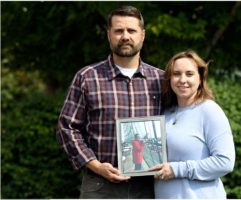Alumni Spotlight
Coming Home
A rural pathologist is building a group home for his son — and other adults with autism.
 Clay was 11 years old the first time he went to a psychiatric hospital.
Clay was 11 years old the first time he went to a psychiatric hospital.
“We had to call an ambulance to take him out of our house,” says his father, Zachary Weber, MD ’06. “He was thrashing and kicking and breaking doors.”
Although they love their son dearly, Weber and his wife, Mindy, knew that sending him away was necessary — partially to protect their younger son, Wesley. “Clay was starting to throw things at us and hit us,” Weber says.
It was the first of several hospitalizations, and, each time, the Webers hoped for a way to bring Clay safely back home.
An alumnus returns
Home has always been important to Weber. He grew up in Kalispell, Montana, and he returned there to practice. “When my dad went to medical school in the 1960s, the WWAMI (Washington, Wyoming, Alaska, Montana, Idaho) program didn’t exist,” Weber says.
In contrast, Weber was able to do rotations throughout the WWAMI region.
“I got exposure to different communities that gave me a sense of where I might want to end up someday,” he says. “I got to work with a lot of doctors, and it helped me understand what small-town medicine looked like.” Then, an experience in the OR — being handed a cancerous liver to examine — set him on his chosen path.
“I knew, that day, that I was going to do pathology, and it turned out to be a great choice for me,” Weber says. “It allows me to have a lot of autonomy and flexibility.”
A shortage of care
Flexibility was especially important after Clay, then 2, was diagnosed with autism. It quickly became clear that Clay’s medical needs would be significant, and for a young family, the costs were overwhelming. And care for kids like Clay, especially in rural areas, was hard to find.
“Every state has a developmental disabilities waiver through Medicaid, but the waiting list can be up to 7 to 10 years,” says Weber.
In other words: A child with autism — a condition where early intervention can make a big difference — could spend much of their childhood waiting for care.
As Clay grew, his symptoms worsened, including violent and destructive outbursts. Antipsychotic medications stabilized him for a while. But when Clay started a fire inside the house, the Webers knew they had to place him in a residential facility for his own safety — and theirs.
There was a shortage of facilities in Montana, so his parents sent him to a hospital in Arkansas, which made it much harder to visit him.
“We were in a really difficult situation, and we didn’t know what the future would hold for our family,” says Weber.
A new hope, a new community
That’s when another couple, Julie and Rich Janssen, reached out to the Webers. The Janssens lived in Ronan, about 50 miles away, and they, too, had a son with autism who needs significant support. For two years, they’d been working on creating a group home for their son, and they invited the Webers to join them.
Together, the two families are developing the Proactive Living Facility, a nonprofit assisted living facility for adults with severe autism. They’ve purchased land and are raising funds for the home’s construction. Eventually, they hope to have four buildings on the property, housing up to 16 residents.
The project will bring much-needed construction and caregiver jobs to Ronan, boosting the local economy. And the Webers and the Janssens say they will happily share their blueprints with others who want to create similar facilities in their communities.
For now, Clay is back home with his family and is stable, thanks to a terrific pediatric psychiatry team and medication. But he’s looking forward to moving in to what he calls the “big boy” house.
“Our son will never be able to live on his own, so our goal is to provide a safe place for our adult children and hopefully for other adult children,” says Weber. “We want to show other parents that it takes a big effort, but you can go out and do it, too.”

